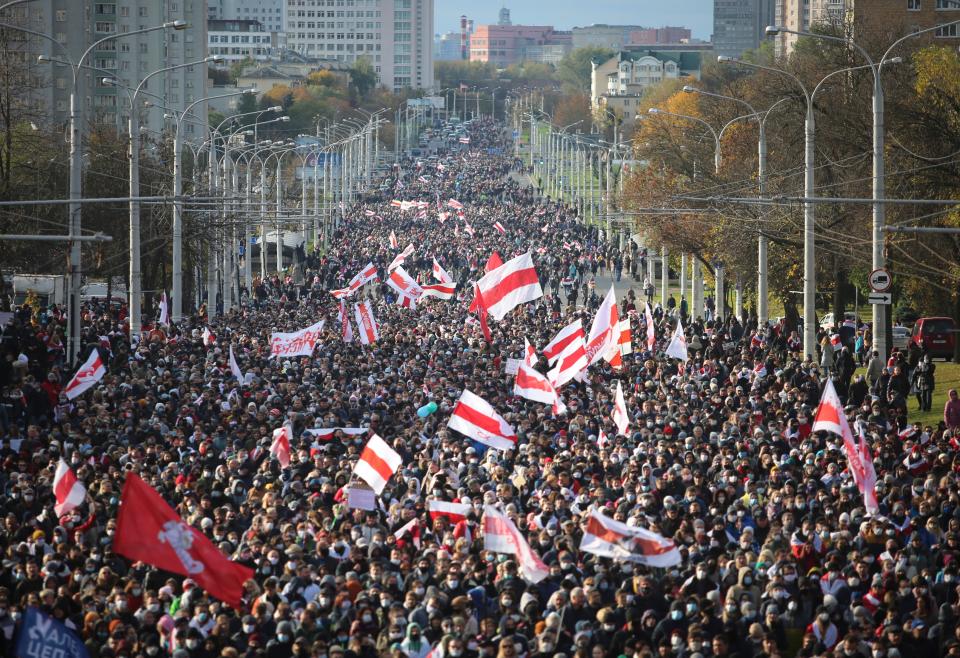Even before coronavirus hit, freedom of expression was already near rock bottom

This year the world has faced a free speech crisis like no other. As the Covid-19 pandemic swept across our borders and into our homes, relationships between family members, colleagues and communities were fundamentally altered. Our freedom of movement has been curtailed, forcing us to interact online to express our fears and frustrations, build connections and navigate a tsunami of often-conflicting information.
And it is not just movement. Around the world, people’s voices are being silenced; critical information cut off just as we need it the most. The powerful are seizing the opportunity to chip away at our ability to challenge them.
There is no doubt that the imprint this period will leave on us all will be profound. But we hold the power of our response.
There are three ways we do this. We can demand our right to speak and to be heard by our governments. We can challenge profit-driven corporations, ensuring we hold them to account. And, through protest and civic engagement, both online and offline, we can redress the corruption and inequality that have held us hostage to our states for too long.
In 2020, we are very far from the full realisation of these rights. There have been huge shifts in power, technology and behaviour, leading to a crisis in trust. Without the right to speak and to know, governments are unable to maintain the credibility necessary to govern. How did we get here?
In this year’s Global Expression Report, we show that the seeds for the breakdown in trust were sewn over many years. The world entered the Covid-19 crisis with protection of the right to freedom of expression and information at its lowest ever point. The Global Expression (GxR) metric shows that 51 per cent of the world’s population now live in countries rated “in crisis”; that is 3.9bn people living in contexts where their ability to speak, know and participate are routinely violated.
Countries with the largest populations and others with great influence – China, India, Russia, Turkey, and Iran – are living in a “crisis of expression”. Brazil has yet to fall into the crisis category, but has seen a steep and accelerating decline, while countries like the US are faltering and creating increasingly hostile environments for communicators and activists.
In 2019 alone, 57 journalists were killed globally, with an impunity rate of around 90 per cent. At least 250 journalists were behind bars at the end of the year, with harassment from security services worsening, sweeping surveillance measures taking hold and internet shutdowns placing blanket restrictions on the ability of millions to access life-saving information.
And we have also seen authorities and police continue to treat protests as a threat to democracy – responding with violence, abusive behaviour toward people who protest and efforts to stigmatise the protesters. We have witnessed attempts at repression not only from countries traditionally considered authoritarian – even historically liberal states like the UK are trying to delegitimise peaceful protest movements like Extinction Rebellion by aligning their cause to those defined as terrorist groups.
But there is room for optimism. Resistance to repression is on the rise. Confronted by state or police brutality and crackdowns on dissent, people took to the streets to demand change in significant numbers. During the pandemic, influential movements in the US, Belarus, Hong Kong, Iran and Lebanon, to name only a few, have given voice to citizens and vulnerable non-citizen groups, rebalancing the relationship between individuals and powerful elites.
Now, we must re-balance power in our favour. It’s time to redefine the contract between the individual and the state everywhere.
Crucially, governments must listen to those they govern, embrace true transparency and ensure the mechanisms of information sharing and participation are strengthened, not eroded.
Progress, for instance on anti-trust laws in the US affecting Big Tech, is especially important when so much of our interaction is mediated by these companies. Collectively, we must continue to reduce the control private bodies have over the free flow of information, improve accountability for content moderation, and push for solutions that distribute knowledge, power and resources to the many, rather than concentrating them in the hands of a few.
When we are prevented from scrutinising those who abuse their power, we can no longer demand basic rights, like clean air, water and food, fair and just conditions of work, an adequate standard of living, the freedom to love and the highest attainable standard of health.
Close to four billion people live in states where freedom of expression is in crisis. It is clear that our freedom to speak and to know is at a perilous juncture. No event has proven this more clearly than the current health crisis.
We must do all we can to stop these restrictions becoming permanent features of our governance systems. We must demand the space to question and to participate. The time to act is now.
Quinn McKew is executive director of ARTICLE 19
Read more
Hong Kong teacher fired for asking class ‘what is freedom of speech?’
Sorry Boris, freedom of speech does not mean you can say what you like
Hong Kong teacher fired for asking class ‘what is freedom of speech?’
Former Facebook executive says tech giants are ‘threat to democracy’
Handing track-and-trace data to police ‘disastrous’ for public trust

